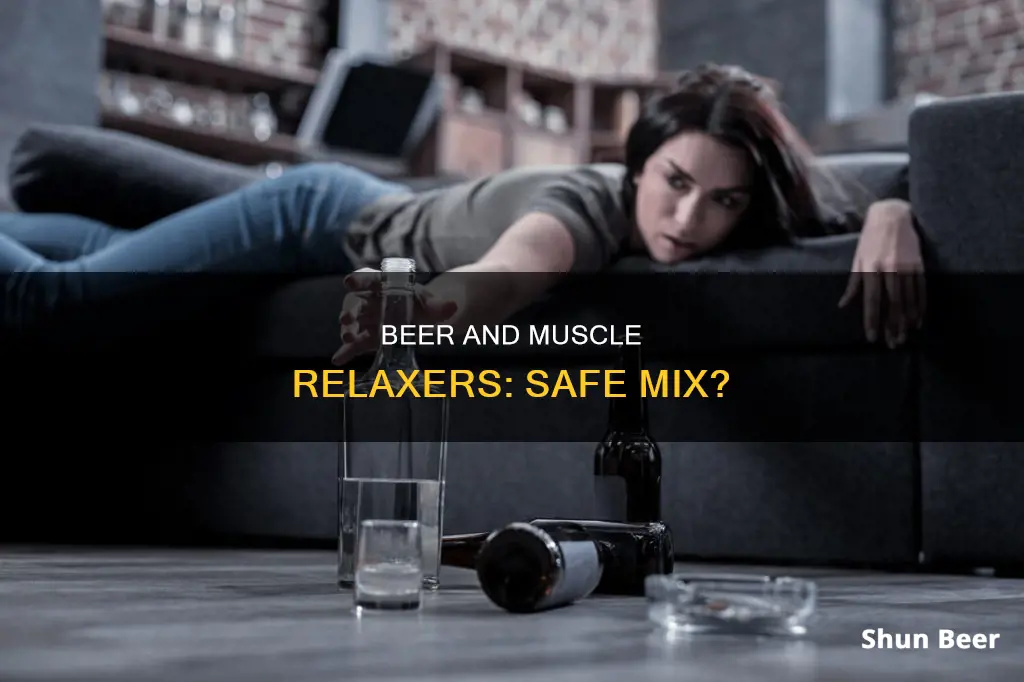
Mixing alcohol and muscle relaxers can have serious health consequences, and in some cases, it can even be fatal. Both substances are central nervous system depressants, which means they slow down brain activity and can lead to a decrease in heart and breathing rates. When combined, the side effects of muscle relaxers, such as drowsiness, dizziness, impaired coordination, and memory problems, can be intensified. This can result in dangerous symptoms, including increased risk of seizures, overdose, and even death. Therefore, it is strongly advised to avoid consuming alcohol while taking muscle relaxers.
| Characteristics | Values |
|---|---|
| Should you mix muscle relaxers and alcohol? | No, it is not advised to mix muscle relaxers and alcohol |
| Why? | Both are central nervous system depressants, so they compound their impact on the body, intensifying side effects such as drowsiness, dizziness, impaired coordination, and confusion. |
| What are the risks? | Liver damage, increased risk of alcohol poisoning, gastrointestinal issues, addiction, seizures, overdose, and even death. |
| What to do if you've already mixed them? | Stop drinking immediately and seek medical attention if necessary. |
What You'll Learn

The dangers of combining muscle relaxers and alcohol
Mixing muscle relaxers and alcohol can have serious health consequences, and it is generally advised to avoid this combination or consult a healthcare provider to understand the specific risks. Both muscle relaxers and alcohol are central nervous system depressants, and when combined, they magnify each other's effects, leading to intensified side effects and serious health problems. Here are some of the dangers associated with mixing muscle relaxers and alcohol:
Short-Term Effects
- Impaired coordination and motor control: The combination of muscle relaxers and alcohol can lead to lethargy, confusion, and poor coordination, increasing the risk of falls, car accidents, and other injuries.
- Sedation and drowsiness: The sedative effects of both substances are amplified when combined, leading to increased drowsiness and sedation. This can further impair an individual's ability to think clearly, make decisions, and perform tasks requiring alertness, such as driving.
- Respiratory depression: Since both substances slow down breathing, mixing them can lead to difficulty breathing or even respiratory failure, which can be life-threatening.
- Increased risk of overdose: The intensified sedative effects of mixing muscle relaxers and alcohol increase the risk of overdose. This is especially true if an individual consumes more than the recommended amount of either substance.
- Alcohol poisoning: Mixing muscle relaxers with alcohol can lead to alcohol poisoning, a potentially life-threatening condition that occurs when an individual drinks too much alcohol in a short period.
Long-Term Effects
- Liver damage: The liver is responsible for processing both alcohol and muscle relaxers. When they are consumed together, it can lead to liver damage as the liver works overtime to process both substances.
- Addiction: Prolonged use of either substance can lead to physical dependence and addiction. Mixing muscle relaxers and alcohol can increase the risk of developing a substance use disorder.
- Gastrointestinal damage: Alcohol and prescription medications can both cause damage to the gastrointestinal tract. Combining them can lead to intestinal damage, making it difficult for the body to absorb nutrients, and other issues such as ulcers, hemorrhoids, constipation, or diarrhea.
- Cognitive impairments: Long-term use of muscle relaxers and alcohol can lead to problems with cognitive function and memory.
- Kidney damage: Mixing muscle relaxers and alcohol can cause kidney damage, as the kidneys struggle to filter out the toxins from both substances.
- Seizures and coma: In severe cases, mixing muscle relaxers and alcohol can lead to seizures and coma.
The Science of Sipping: Beer Steins Explained
You may want to see also

Why mixing muscle relaxers and alcohol is a bad idea
Mixing muscle relaxers and alcohol can have serious consequences, and it is important to understand the risks involved. Both substances are central nervous system depressants, which means they slow down activity in the brain and nervous system. When combined, they can compound their impact on the body, leading to intensified side effects and potentially dangerous symptoms. Here are some reasons why mixing muscle relaxers and alcohol is a bad idea:
Intensified Side Effects
Muscle relaxers and alcohol share common side effects such as dizziness, drowsiness, nausea, and impaired coordination. When mixed, these side effects become even more pronounced and intense. This can lead to an increased risk of falls, accidents, and injuries.
Dangerous Health Problems
The combination of muscle relaxers and alcohol can lead to serious health problems, including respiratory depression and even death. The sedative effects of both substances can result in slowed or difficulty breathing, impaired motor control, and an increased risk of overdose.
Liver Damage
Mixing alcohol and muscle relaxers can cause damage to the liver, which is responsible for processing both substances. The liver has to work overtime when they are consumed together, leading to potential liver damage.
Increased Risk of Addiction
Both alcohol and muscle relaxers act on the brain's reward center, causing pleasurable effects. Combining them can lead to an increased risk of developing a substance use disorder and physical dependence, making it difficult to quit without experiencing withdrawal symptoms.
Alcohol Poisoning
Mixing muscle relaxers with alcohol can increase the risk of alcohol poisoning, a serious and potentially life-threatening condition. Alcohol poisoning occurs when a person drinks too much alcohol in a short period, leading to vomiting, seizures, and blackouts.
Gastrointestinal Damage
Alcohol and prescription medications can both cause damage to the gastrointestinal tract. Over time, alcohol can cause inflammation and scarring in the GI tract, while muscle relaxers can lead to negative side effects such as ulcers, hemorrhoids, constipation, or diarrhea.
In conclusion, mixing muscle relaxers and alcohol can have severe and dangerous consequences. It is important to understand the risks involved and avoid combining these substances to prevent potential health problems and negative side effects. If you or someone you know is struggling with substance abuse, seek professional help immediately.
Drinking Beer at Disney World: What's Allowed?
You may want to see also

The side effects of mixing muscle relaxers and alcohol
Mixing muscle relaxers and alcohol can have serious consequences, including problems with coordination and even difficulty breathing. Both substances are central nervous system depressants, which means they slow down the central nervous system. When combined, they magnify each other's effects, leading to intensified side effects such as dizziness, drowsiness, nausea, and impaired coordination. This can result in falls, car accidents, and other injuries.
The short-term effects of mixing muscle relaxers and alcohol include impairment and motor control issues. The ability of these drugs to depress the central nervous system can lead to an inability to think clearly, impaired judgment, dangerous mood swings, and even aggressive behaviours. Mixing these substances can also cause poor vision and confusion, further increasing the risk of accidents.
The long-term effects of combining muscle relaxers and alcohol are even more concerning. Continually ingesting these substances can cause damage to internal organs, especially the liver and kidneys. Mixing alcohol and muscle relaxers also increases the risk of developing a substance use disorder, particularly in women. Other potential long-term dangers include:
- Liver damage: The liver is responsible for processing both alcohol and muscle relaxers. When they are consumed together, the liver works overtime, leading to potential damage.
- Addiction: Both substances act on the brain's reward centre, causing pleasurable effects. Prolonged use can lead to physical dependence and addiction.
- Overdose: The sedative effects of both substances are amplified when combined, increasing the risk of overdose and respiratory depression.
- Alcohol poisoning: Mixing muscle relaxers with alcohol can lead to alcohol poisoning, a life-threatening condition characterised by vomiting, seizures, and blackouts.
- Gastrointestinal damage: Alcohol and prescription medications can cause inflammation and scarring in the lining of the GI tract. Over time, this can lead to negative side effects such as ulcers, hemorrhoids, constipation, or diarrhea.
It is important to note that the potential negative consequences of mixing muscle relaxers and alcohol far outweigh any perceived benefits. If you or someone you know is struggling with substance abuse, seek professional help immediately.
Beer and Steroid Shots: Safe Mix or Health Risk?
You may want to see also

What to do if you've mixed muscle relaxers and alcohol
Mixing muscle relaxers and alcohol can have serious health consequences, so it is important to act quickly and efficiently if you or someone you know has mixed the two. Here is a list of steps to take if you've mixed muscle relaxers and alcohol:
- Seek Medical Help: Call emergency services or take the person to the nearest hospital immediately. Do not wait for symptoms to appear as they may be dangerous and life-threatening.
- Provide Information: Be honest with medical professionals about what substances were consumed and the quantities. This will help them provide the appropriate treatment.
- Monitor Vital Signs: Keep an eye on the person's breathing, pulse, and level of consciousness while waiting for medical assistance. If their breathing becomes shallow or irregular, or they lose consciousness, begin CPR if you are trained to do so.
- Do Not Leave Them Alone: Stay with the person until help arrives. If they lose consciousness, place them in the recovery position to prevent choking in case of vomiting.
- Avoid Further Intake: Do not allow the person to consume any more alcohol or muscle relaxers.
- Follow Medical Advice: Once medical professionals arrive, follow their instructions. They may administer treatments such as activated charcoal or intravenous fluids to stabilise the person's condition.
- Prevent Future Incidents: After the situation has stabilised, have an open and honest conversation about the dangers of mixing muscle relaxers and alcohol. Encourage the person to seek help if they have a problem with substance abuse.
Mixing muscle relaxers and alcohol can be extremely dangerous, so it is important to take these steps to ensure the safety and well-being of the affected individual.
Apple Cider Vinegar and Beer: A Healthy Mix?
You may want to see also

The potential for addiction when mixing muscle relaxers and alcohol
Mixing muscle relaxers and alcohol can have serious health consequences and can even be fatal. Both substances are central nervous system depressants, which means they slow down activity in the brain and central nervous system. This can alter perception, behaviour and movement in dangerous ways.
When alcohol and muscle relaxers are combined, their effects are intensified. The short-term risks associated with this combination are related to how each substance affects the brain and body. Both substances produce sedative effects on the body, and share common side effects such as dizziness, drowsiness, nausea, and impaired coordination. This can make it dangerous to operate machinery or drive a car, and can also lead to falls and other injuries.
The ability of these drugs to depress the central nervous system can also lead to an inability to think clearly, impaired judgment, dangerous mood swings, and aggressive behaviours.
The long-term effects of mixing muscle relaxers and alcohol are even more concerning. Continually ingesting these substances can cause damage to internal organs, including the liver and kidneys. Mixing these substances also increases the risk of developing a substance use disorder, and can lead to addiction as both substances act on the brain's reward centre, causing a person to feel pleasurable effects.
Mixing muscle relaxers and alcohol can also lead to overdose and alcohol poisoning, which can be life-threatening. Additionally, both substances can cause damage to the gastrointestinal tract, leading to issues such as ulcers, hemorrhoids, constipation, or diarrhea.
It is important to note that the potential for addiction and the severity of side effects are increased when muscle relaxers and alcohol are combined. If you or someone you know is struggling with addiction to either substance, seeking professional help is crucial.
Beer Drinking Rules in North Carolina's Parks
You may want to see also
Frequently asked questions
No, it is not safe to drink beer or any other type of alcohol while taking muscle relaxers. Both alcohol and muscle relaxers are central nervous system depressants, which means they slow down brain activity and can lead to dangerous side effects when combined.
Mixing muscle relaxers and alcohol can lead to increased risk of seizures, overdose, respiratory depression, impaired motor control and coordination, drowsiness, dizziness, memory problems, and even death.
Muscle relaxers can stay in your system for longer than 24 hours, so it is recommended to wait at least 24 to 36 hours after taking your last dose of the muscle relaxer before consuming any alcohol.
Both muscle relaxers and alcohol have sedative effects and can enhance each other's side effects, leading to extreme sedation, decreased cognitive abilities, impaired motor functioning, accidental death, and increased risk of addiction.
If you have already mixed muscle relaxers and alcohol, stop drinking immediately and seek medical help if needed. It is important to monitor your vital signs and seek emergency medical attention if you experience any severe side effects or symptoms of overdose.







